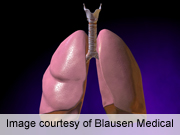
MONDAY, Oct. 29 (HealthDay News) — Many people with incurable lung cancer mistakenly believe that radiation therapy meant to ease their pain and other symptoms may cure their disease, researchers report.
This type of treatment is called palliative radiation therapy and can improve patients’ quality of life, but will not cure their cancer.
The researchers looked at data from nearly 400 patients over the age of 21 with incurable lung cancer who received or were scheduled to receive palliative radiation therapy. Findings from surveys completed by the patients four months after their lung cancer diagnosis showed that most of them believed that palliative radiation therapy could help them.
The investigators found that 78 percent of the patients believed that palliative radiation therapy was “very” or “somewhat likely” to help them live longer, and 67 percent believed that it was “very” or “somewhat likely” to help them with cancer-related symptoms or problems.
However, 64 percent did not understand that palliative radiation therapy was not at all likely to cure their cancer.
The study was scheduled for presentation Monday at the annual meeting of the American Society for Radiation Oncology in Boston.
“Our study found that, though most lung cancer patients are optimistic about the effectiveness of radiation therapy in relieving symptoms and prolonging life, many have inaccurate beliefs about the ability of palliative radiation therapy to cure their cancer,” lead author Dr. Aileen Chen, a radiation oncologist at Dana-Farber Cancer Institute in Boston, said in a society news release.
“In order to help patients make informed decisions about radiation treatments near the end of life, health care providers need to improve communication and understanding about the goals and limitations of palliative radiation therapy,” Chen said. “While palliative radiation therapy can be very effective at relieving symptoms from cancer, overly intensive care can also reduce patients’ quality of life and lead to significant time and financial burdens for patients and their families.”
On average, patients with lung cancer that has spread survive less than one year, and less than 5 percent survive five years, the study authors pointed out.
The data and conclusions of research presented at medical meetings are typically considered preliminary until published in a peer-reviewed medical journal.
More information
The U.S. National Cancer Institute has more about lung cancer.

